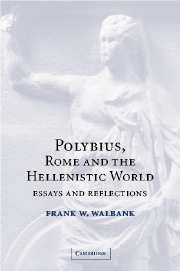Book contents
- Frontmatter
- Contents
- Preface
- Acknowledgements
- List of abbreviations
- 1 Polybian studies, c. 1975–2000
- HISTORICAL AND GEOGRAPHICAL PAPERS
- POLYBIUS AS A HISTORIAN
- POLYBIUS ON ROME
- 16 Supernatural paraphernalia in Polybius' Histories
- 17 ‘Treason’ and Roman domination: two case-studies, Polybius and Josephus
- 18 A Greek looks at Rome: Polybius vi revisited
- TRANSMISSION OF POLYBIUS
- Bibliography
- Indexes
18 - A Greek looks at Rome: Polybius vi revisited
Published online by Cambridge University Press: 22 September 2009
- Frontmatter
- Contents
- Preface
- Acknowledgements
- List of abbreviations
- 1 Polybian studies, c. 1975–2000
- HISTORICAL AND GEOGRAPHICAL PAPERS
- POLYBIUS AS A HISTORIAN
- POLYBIUS ON ROME
- 16 Supernatural paraphernalia in Polybius' Histories
- 17 ‘Treason’ and Roman domination: two case-studies, Polybius and Josephus
- 18 A Greek looks at Rome: Polybius vi revisited
- TRANSMISSION OF POLYBIUS
- Bibliography
- Indexes
Summary
In 217 bc a conference was held at Naupactus on the Corinthian Gulf to try to bring to an end the war between the Macedonian Confederacy, led by Philip V, and the Aetolian League. It became famous for a remarkable speech by Agelaus of Naupactus, who, if we can believe Polybius' account, urged all Greeks to bury their differences and to turn their eyes to the ‘cloud in the west’, that is to the struggle between Carthage and Rome, since the winner in that conflict was likely to go on to destroy Greek freedom. Almost exactly fifty years later, in 168, at the battle of Pydna, that prophecy was fulfilled: for in that year the Macedonian monarchy under Perseus was abolished and the Seleucid king Antiochus IV was humiliated by a Roman envoy at Eleusis in Egypt. Henceforth Rome was the undisputed superpower. The Roman victory was followed by a purge throughout Greece, as a result of which most men of influence found themselves detained in Italy. Among them was the Achaean statesman and future historian, Polybius, who was to spend the next sixteen years in Italy, where he planned and began his great history of Rome. In this he set out to show ‘how and thanks to what kind of constitution’ (πω̃ς καί τίνι γένει πολιτείας) Rome had become mistress of the inhabited world, the oecumene, in not quite fifty-three years.
In its original form this history was designed to cover the years 220 to 167 in thirty books.
- Type
- Chapter
- Information
- Polybius, Rome and the Hellenistic WorldEssays and Reflections, pp. 277 - 292Publisher: Cambridge University PressPrint publication year: 2002
- 2
- Cited by

